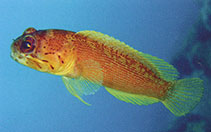| Family: |
Opistognathidae (Jawfishes) |
| Max. size: |
7.9 cm TL (male/unsexed) |
| Environment: |
demersal; marine; depth range 2 - 35 m |
| Distribution: |
Western Pacific: Indonesia. |
| Diagnosis: |
Dorsal spines (total): 11-11; Dorsal soft rays (total): 11-11; Anal spines: 2-2; Anal soft rays: 10-10; Vertebrae: 26-26. This species is distinguished by the following characters: upper jaw extending about 0.7-0.9 eye diameters behind posterior margin of orbit, the maxilla widest at end, without a flexible lamina posteriorly; D XI,11; A II,10. Colouration: body generally yellowish brown, slightly darker on back, with narrow red-brown stripes outlining each yellow-tan lateral scale row and fins without dark spots are distinctive markings; cheeks with a few scattered, small, dark, brown spots, also with narrow oblique lines; posterior infraorbital pore positions occupied by multiple pores; most preopercular pore positions bi-pored (Ref. 75148). |
| Biology: |
Specimens were collected on the edge of a 200 m-wide channel between the mainland and a small island, where the area is exposed to periodic strong currents associated with tidal fluctuation. It is characterized by relatively rich coral grading to rubble in deeper water with a maximum depth of about 50 m. It has a series of vents, at depths of about 2-35 m, which releases large volumes of freshwater and the abrupt salinity changes are visible due to the blurring effect of the fresh- and seawater mixture. About 10 burrows of this species were detected on rubble bottoms in about 20-25 m depth during the 2006 and 2007 visits. The two type specimens were taken from their burrows using a clove oil-alcohol solution (Ref. 75148). |
| IUCN Red List Status: |
Not Evaluated (N.E.) Ref. (130435)
|
| Threat to humans: |
|
Source and more info: www.fishbase.org. For personal, classroom, and other internal use only. Not for publication.

